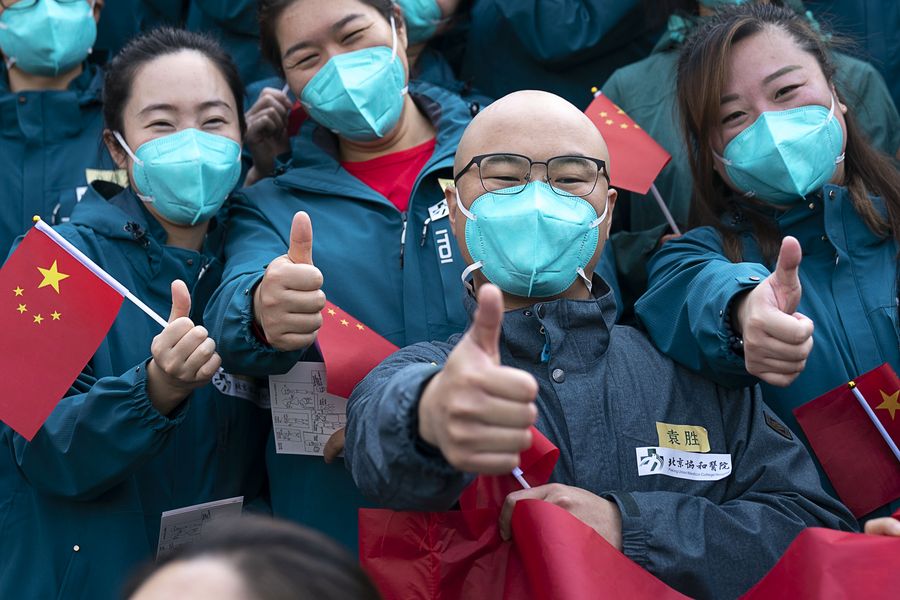Bring COVID-19 under control with joint efforts
China has effectively contained the spread of the novel coronavirus and made important contributions to the global fight against the pandemic.
After a delay of more than two months, the annual sessions of China's national legislature and the top political advisory body will be convened later this week.
It shows that China has effectively contained the spread of the novel coronavirus and made important contributions to the global fight against the pandemic.

Medics from the Peking Union Medical College Hospital thumb up before leaving Wuhan, capital of central China's Hubei province, April 15, 2020. [Photo/Xinhua]
The "two sessions" are expected to make overall arrangements for China's economic and social development, and feature measures ensuring an ultimate victory in the country's battle against extreme poverty, as well as the completion of building a moderately prosperous society in all respects under regular epidemic prevention and control.
On Monday, the 73rd session of World Health Assembly (WHA) started via video link, focusing on the global response to COVID-19.
A fight against a new virus
"In China, after making painstaking efforts and enormous sacrifice, we have turned the tide on the virus and protected the life and health of our people," Chinese President Xi Jinping made the remarks when delivering a speech at the opening of the WHA session.
"All along, we have acted with openness, transparency and responsibility," he added.
At the end of 2019, patients with pneumonia of unknown cause were reported in Wuhan city of Hubei province, according to the city's health authority.
On Jan. 2, 2020, the Chinese Center for Disease Control and Prevention (China CDC) received the first batch of samples of four patients from Hubei.
Starting Jan. 3, China has been regularly informing the World Health Organization (WHO), relevant countries and regions and China's Hong Kong, Macao and Taiwan about the pneumonia outbreak.
On Jan. 7, when presiding over a meeting of the Standing Committee of the Political Bureau of the Communist Party of China (CPC) Central Committee, General Secretary Xi Jinping put forward clear requirements for the prevention and control of the disease.
On the morning of Jan. 23, the city of Wuhan entered lockdown. Xi made the strategic decision, which he said required huge political courage.
On Jan. 25, the first day of the Chinese lunar new year, Xi and six members of the Standing Committee of the Political Bureau of the CPC Central Committee met and decided to set up a central leading group for the epidemic response.
A fight of the nation
A total of 346 medical teams consisting of over 42,600 medical workers from across the country and the military went to Hubei to help the province save lives.
The number of hospitalized COVID-19 cases in Wuhan fell to zero on April 26.
Decisive achievements have been secured in protecting Wuhan and Hubei. The nationwide fight against the virus, which had infected over 80,000 people and killed more than 4,600, saw major strategic achievements.
On April 8, Wuhan reopened after a 76-day lockdown.
On the same day, Xi stressed at a meeting of the Standing Committee of the Political Bureau of the CPC Central Committee that while implementing the regular epidemic prevention and control measures, efforts should be made to comprehensively restore life and work back to normal, in a bid to secure a decisive victory in the country's battle against extreme poverty and the completion of the building of a moderately prosperous society in all respects.
Due to the impact of the epidemic, China's gross domestic product contracted 6.8 percent year on year in the first quarter. However, its major economic indicators have been improving since March with the value-added industrial output and exports returning to growth in April.
A fight for the world
China's fight against the epidemic is also a fight for the world. At present, global confirmed cases have topped 4.4 million, with more than 300,000 deaths from the disease.
Xi noted on multiple occasions that China is fulfilling its responsibility for the life and health of its own people and for global public health with the vision of building a community with a shared future for humanity.
"We must strengthen international cooperation," Xi said at the 73rd WHA.
China has sent more than 20 medical expert teams overseas, provided much-needed anti-virus supplies to over 150 countries and international organizations and donated a total of US$50 million to the WHO to support its response to the pandemic.
Xi said China will provide US$2 billion over two years to help with COVID-19 response and with economic and social development in affected countries, especially developing countries.
He said China will establish a cooperation mechanism for its hospitals to pair up with 30 African hospitals.
"The virus knows no borders or races. In the face of this non-traditional security challenge, people around the world have become fully aware that humanity is living in a community with a shared future, and that solidarity and cooperation are the most powerful weapons to fight the pandemic," said Chen Xulong, a senior researcher with the China Institute of International Studies.
"The most important thing is to work together and not let differences stand in the way of joint efforts to battle the pandemic," said Vladimir G. Gusakov, head of the National Academy of Sciences of Belarus.

